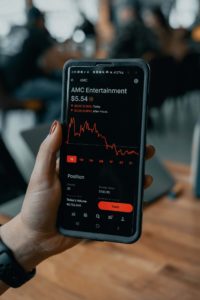
By Steve Lowrie, CFA
Special to the Financial Independence Hub
Is it just our imagination or has there been an uptick lately in exciting “new” trading tactics for seizing riches from exotic new markets?
After a year of sitting at home, an excitable generation of do-it-yourself traders has replaced traditional leisure-time activities with online pursuits: including aggressive, Tweet-worthy trading for fun and profit.
The result? Waves of volatile financial feeding frenzies and overnight sensations, egged on by a brood of freshly hatched social media stars and a spate of flashy new trading platforms with captivating names like Robinhood.
All this might seem new and different, if I hadn’t already seen such eerily similar circumstances so often before, with so many unhappy endings. I suppose that puts me in the same curmudgeonly camp as 97-year-old billionaire Charlie Munger (Warren Buffett’s long-time Berkshire Hathaway partner). He pulled no punches in this recent interview about Robinhood:
“[Some] may call it investing,” he said, “but that’s all bulls**t. It’s really just wild speculation, like casino gambling or racetrack betting. There’s a long history of destructive capitalism, these trading orgies whooped up by the people who profit from them.”
Speaking of Warren Buffett, a recent Financial Post article asked the question: “What would Warren Buffett make of this stock market silly season?” The answer was that he already has weighed in on the matter many times before, including one of my favourite “Buffettisms”:
“The stock market is a device for transferring money from the impatient to the patient.”
Impatience in Action
But maybe this time is different after all? Let’s take a closer look. The current wave of “get rich quick” mentality launched in January 2021, when a Reddit-driven rally abruptly sent the prices of several unloved stocks like GameStop through the roof.
More recently, special purpose acquisition companies (SPACs) have captured a lot of attention. “When SPAC-Man Chamath Palihapitiya Speaks, Reddit and Wall Street Listen,” observed a recent Wall Street Journal column. “Amateur traders hang on [Palihapitiya’s] every word for clues about his next target: and for the insults he hurls at the high-finance elite.”
Non-fungible tokens (NFTs) have also been taking the trading world by storm. If you think of an NFT as being like a collectible — say, an autographed baseball card — but in digital format, you’re getting close to envisioning its worth. Similar to playing cards, people are collecting these pieces of code, typically exchanging them in cryptocurrency such as bitcoin.
How much can an NFT be worth if the collectible attached to it is in high demand? However much the market decides. In this recent extreme case, “NFT Mania” garnered $69 million for a piece of digital artwork.
Innovations vs. Investments
At least on paper, some have amassed rapid fortunes by trading into these sorts of innovations to catch a wave of risk-laden opportunity. But will these brave speculators manage to convert their good fortune into lasting wealth once today’s trends fizzle or fly?
Not if they ignore their history lessons. Because underneath it all, many of the same old telltale signs of an unsustainable surge seem front and center to me. For example, much of the current action is highly reminiscent of the 1990s tech bubble, when a trade at nearly any price into almost any company with a high-tech name seemed sure to pay off handsomely … right up until most of them no longer did. Similar to what we saw in the late 1990s:
- Do-it-yourself investing has soared; brokerage firms can barely keep up with the demand, leading to delayed trades, system crashes, and support center busy signals. The “house” (brokers, hedge funds, etc.) is making record profits on the trading volume.
- Headlines are jam-packed with success stories about disruptive new technology trading, but “success” is being measured in hours or days, not quarters and years (or better yet, decades).
- Popular trade valuations are heading to the sky. Some companies are selling their own shares into the surge, and issuing stocks instead of bonds, even though loan rates are at historical lows.
- DIY investors keep buying anyway, at seemingly any price. In its rebuttal to Munger, Robinhood suggested he was being “elitist” and out of touch with “the cultural shift that is taking place in our nation today.”
Time will tell whether Munger’s or Robinhood’s “culture” will prevail. But our money is on Munger’s position for the long haul. In “The Psychology of Money,” Morgan Housel describes two types of market participants: short-term traders and long-term investors.
“Short-term traders operate in an area where the rules governing long-term investing — particularly around valuation — are ignored, because they’re irrelevant to the game being played. Bubbles do their damage when long-term investors playing one game start taking their cues from those short-term traders playing another.”
In another powerful piece, “Financial Implications of Robinhood Investors,” financial author Larry Swedroe took a look at a recent academic study that analyzed the new breed of stock market participants using Robinhood’s no minimum, zero-commission trading platform. The study found that Robinhood participants tend to be younger, less wealthy, and hungry for more frequent, higher-volatility trades. In aggregate, “zero-commission investors behave as noise traders,” with a market impact similar to past noise trading and inventory risk models.
Thriving in the Financial Jungle
In other words, hot trends strike us as business as usual in the financial jungle. Fortunes will rapidly rise overnight. But many will fade just as suddenly. A few will strike it rich. Far more will be left licking their wounds … if they’re lucky.
That’s a dicey way to patiently pursue your long-term financial goals. You may be seeking to harvest returns from the same market, but your end goals are entirely different from those of noise traders on the prowl. Remember these differences if you ever feel a little left out of all the excitement. It should address your concerns about whether they know something you don’t.
As 16th century Renaissance mathematician and gambler Gerolamo Cardano reportedly once said: “The greatest advantage in gambling lies in not playing at all.”
 Steve Lowrie holds the CFA designation and has 25 years of experience dealing with individual investors. Before creating Lowrie Financial in 2009, he worked at various Bay Street brokerage firms both as an advisor and in management. “I help investors ignore the Wall and Bay Street hype and hysteria, and focus on what’s best for themselves.” This blog originally appeared on his site on Mar. 19, 2021 and is republished here with permission.
Steve Lowrie holds the CFA designation and has 25 years of experience dealing with individual investors. Before creating Lowrie Financial in 2009, he worked at various Bay Street brokerage firms both as an advisor and in management. “I help investors ignore the Wall and Bay Street hype and hysteria, and focus on what’s best for themselves.” This blog originally appeared on his site on Mar. 19, 2021 and is republished here with permission.


